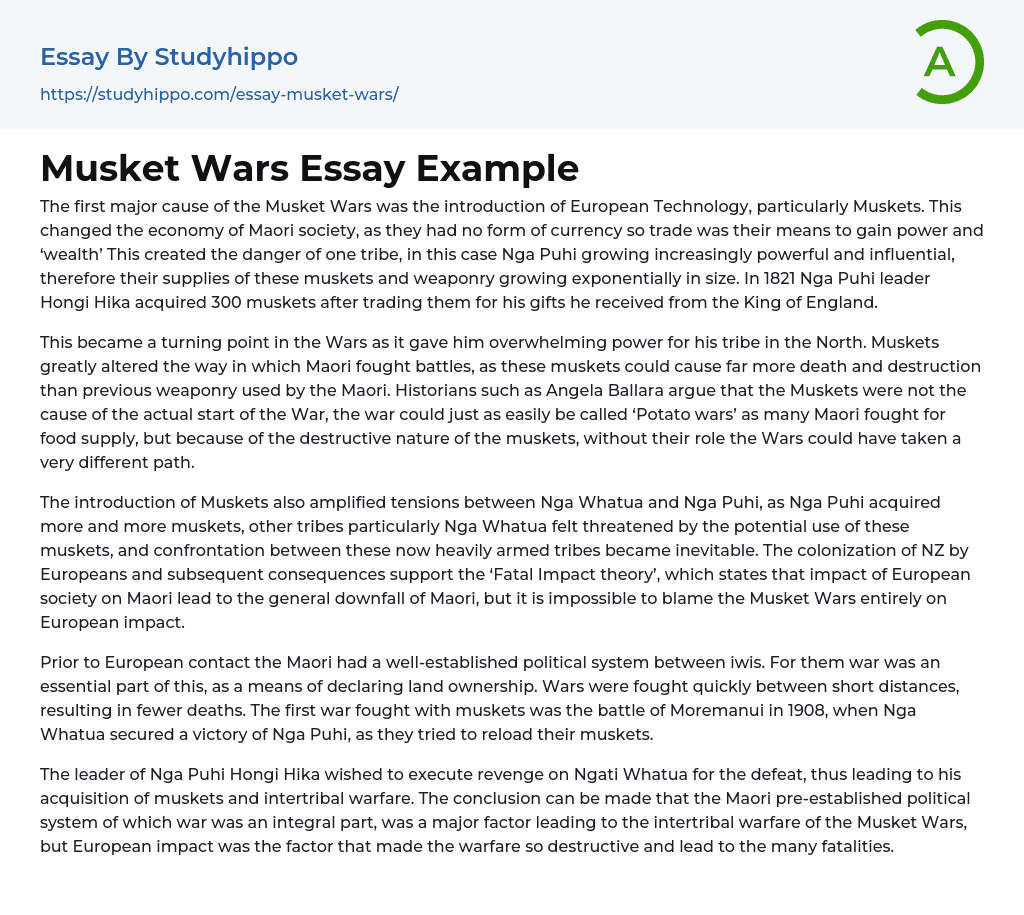The first major cause of the Musket Wars was the introduction of European Technology, particularly Muskets. This changed the economy of Maori society, as they had no form of currency so trade was their means to gain power and ‘wealth’ This created the danger of one tribe, in this case Nga Puhi growing increasingly powerful and influential, therefore their supplies of these muskets and weaponry growing exponentially in size. In 1821 Nga Puhi leader Hongi Hika acquired 300 muskets after trading them for his gifts he received from the King of England.
This became a turning point in the Wars as it gave him overwhelming power for his tribe in the North. Muskets greatly altered the way in which Maori fought battles, as these muskets could cause far more death and destruction than previous weaponry used by the Mao
...ri. Historians such as Angela Ballara argue that the Muskets were not the cause of the actual start of the War, the war could just as easily be called ‘Potato wars’ as many Maori fought for food supply, but because of the destructive nature of the muskets, without their role the Wars could have taken a very different path.
The introduction of Muskets also amplified tensions between Nga Whatua and Nga Puhi, as Nga Puhi acquired more and more muskets, other tribes particularly Nga Whatua felt threatened by the potential use of these muskets, and confrontation between these now heavily armed tribes became inevitable. The colonization of NZ by Europeans and subsequent consequences support the ‘Fatal Impact theory’, which states that impact of European society on Maori lead to the general downfall of Maori, but
it is impossible to blame the Musket Wars entirely on European impact.
Prior to European contact the Maori had a well-established political system between iwis. For them war was an essential part of this, as a means of declaring land ownership. Wars were fought quickly between short distances, resulting in fewer deaths. The first war fought with muskets was the battle of Moremanui in 1908, when Nga Whatua secured a victory of Nga Puhi, as they tried to reload their muskets.
The leader of Nga Puhi Hongi Hika wished to execute revenge on Ngati Whatua for the defeat, thus leading to his acquisition of muskets and intertribal warfare. The conclusion can be made that the Maori pre-established political system of which war was an integral part, was a major factor leading to the intertribal warfare of the Musket Wars, but European impact was the factor that made the warfare so destructive and lead to the many fatalities.
- Air Force essays
- Army essays
- Soldiers essays
- Army Values essays
- United States Army essays
- Veteran essays
- Aircraft essays
- Sergeant essays
- Culture essays
- Social Control essays
- Citizenship essays
- Social Justice essays
- Caste System essays
- Social Responsibility essays
- Socialization essays
- Deviance essays
- Modern Society essays
- Popularity essays
- Civil Society essays
- Community essays
- Female essays
- Filipino People essays
- Igbo People essays
- Indigenous Australians essays
- Indigenous Peoples essays
- Minority Group essays
- Social Institution essays
- Men essays
- The nation essays
- Middle Class essays
- Social Norms essays
- Discourse Community essays
- Popular Culture essays
- Car Culture essays
- American Culture essays
- Mormon essays
- Indian Culture essays
- Mexican Culture essays
- Pop Culture essays
- Cultural Differences essays
- Culture Shock essays
- Different Cultures essays
- World War I essays
- World War Ii essays
- Atomic Bomb essays
- American Civil War essays
- Attack essays
- Cold War essays
- Crimean War essays
- Emilio Aguinaldo essays




